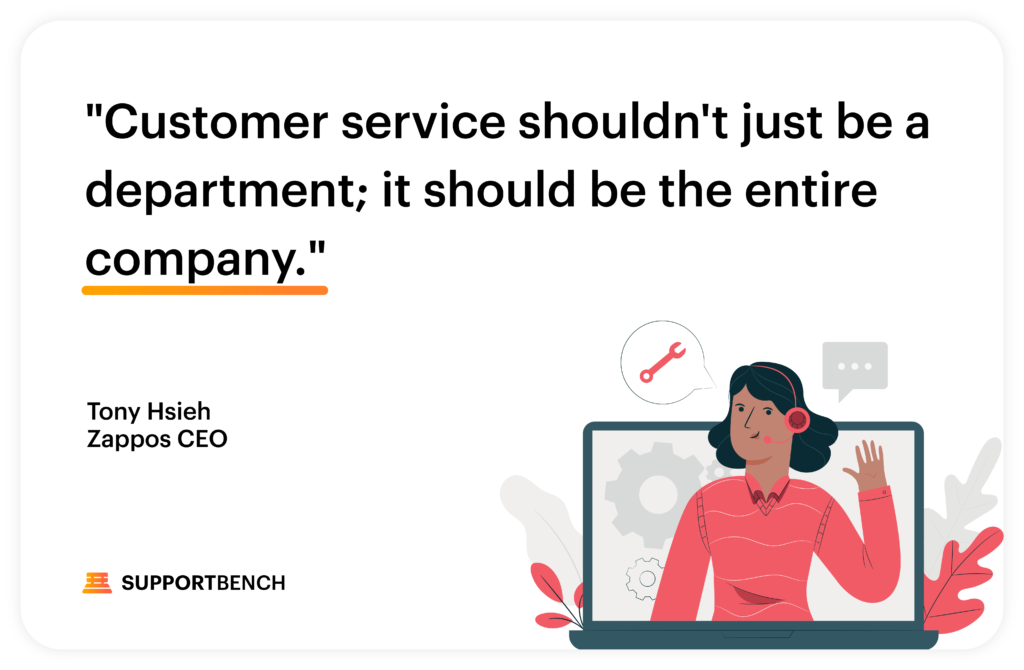The role of support teams has historically been underplayed. Once seen as merely the department that ‘fixed things’, it has been traditionally undervalued in many organizations. But the world is changing, and with it, the role and importance of support teams. A study by Microsoft revealed that 56% of people globally have stopped doing business with a company because of a poor customer service experience. The magnitude of this finding indicates that support teams are indeed central to a business’s success.
“Customer service shouldn’t just be a department; it should be the entire company.” – Tony Hsieh, Zappos CEO.
Today’s B2B landscape is defined not just by the quality of products or services offered but by the entire customer journey. With a study by Microsoft revealing that 56% of people globally have ceased doing business due to a poor customer service experience, it’s clear that stakes are higher than ever. The words of Zappos CEO, Tony Hsieh resonate deeply: “Customer service shouldn’t just be a department; it should be the entire company.”
For businesses hesitant about transitioning to an advanced support platform, it’s crucial to understand the five potential consequences:

Eroding Customer Trust:
Without a consistent, reliable support system, customers can feel left in the dark. The absence of dynamic SLAs, for instance, can lead to delays and inconsistencies. Over time, these inefficiencies can erode trust, leading to a dwindling customer base and reduced contract renewals.
Missed Insights and Business Opportunities:
AI-driven insights, like those offered by Supportbench, facilitate a deeper understanding of customer sentiments and behaviors. Businesses without these insights risk missing out on opportunities for improvement, upselling, and cross-selling.
Decreased Competitive Edge:
As more businesses deploy sophisticated support platforms, their capability to deliver superior customer experiences grows. Companies not making a similar investment will find themselves lagging, struggling to compete in a market that values both product excellence and stellar customer support.
Increased Operational Costs:
Without a unified platform like Supportbench, businesses can end up using a mishmash of tools, leading to inefficiencies, missed communication, and increased operational costs.
Limited Scalability:
The lack of an adaptable support platform can stifle growth. As a company expands, so does its customer base, and with it, the volume and complexity of support queries. Without a scalable platform, businesses risk being overwhelmed, leading to inferior support and customer dissatisfaction.
In order to circumvent these potential pitfalls, and with the rising importance of customer experience, organizations can still ensure that their support teams are up to the task. Here are 5 actionable trends every B2B support leader should consider:
Adopting Advanced SLAs (Service Level Agreements)
Dynamic SLAs are now becoming more prevalent, as they allow for adaptable responses based on real-time situations. For example, if a client’s renewal is around the corner, a tighter SLA ensures prompt attention, translating into a superior customer experience.
You can begin by mapping out all potential customer interactions and assign priority levels to each, considering urgency and business impact. It would be great if you had a System like Supportbench, which is designed for the B2B and so provides dynamic SLAs to ensure consistency and adaptability in responses.
Incorporating AI-driven Insights
Companies are leveraging AI for enhanced customer support. AI-driven features like sentiment analysis and intent detection enable proactive responses to customer needs. As noted by Gartner, by 2023, more than 50% of enterprises will spend more per annum on chatbot creation than traditional mobile app development.
Begin by analyzing frequently asked questions and consider deploying chatbots for instant answers. Again, using a tool like Supportbench that embeds AI-driven insights directly, thus eliminating the need for external integrations. And of course, work on training your support team on understanding AI insights for more personalized customer interactions.
Focus on Holistic Customer Views
A 360-degree customer overview is becoming indispensable. By having a complete picture of the customer’s interactions, preferences, and feedback, support teams can offer more contextual assistance. As Steve Jobs once remarked, “You’ve got to start with the customer experience and work back toward the technology, not the other way around.”
It’s vital to integrate all customer data sources into a unified platform. This ensures every team member can easily access this data before interacting with a client. Platforms like Supportbench offer this capability inherently, thus allowing support teams to always be one step ahead.
Elevating Support with Knowledge Bases
A study by Forrester showcased that 67% of customers prefer self-service over speaking to a company representative. Knowledge bases play a pivotal role in this self-service era.
It’s so important to continuously update your knowledge base with the latest FAQs. And once that’s in place, if you monitor your user interactions, you can easily identify gaps in the information provided. Platforms like Supportbench that emphasize on Knowledge-Centered Service (KCS), ensure customers find what they need.
Personalizing the Support Experience with Customer Health Scores
Understanding a customer’s ‘health’ can be the difference between retention and churn. By tracking a customer’s interaction, feedback, and concerns, businesses can proactively address issues, often before the customer even raises them.
You can consider developing a scoring mechanism that factors in feedback, interaction frequency, and issue resolution times. This will help you act upon low health scores immediately by reaching out and addressing concerns. And of course using B2B tools like Supportbench which offer integrated customer health scoring for real-time insights will help immensely.
In summary:
The age-old adage, “change or perish” holds true. B2B organizations that fail to recognize the importance of premium customer support are risking not only lost revenue but also their very relevance in an increasingly competitive marketplace. As the world evolves, Supportbench remains steadfast in its commitment to elevating support teams and, by extension, the businesses they serve.
A combination of the right tools, strategies, and an unyielding commitment to customer satisfaction is elevating the role of support teams in organizations. The era where support teams are the heroes, shaping and driving business success, is indeed here. And as the landscape continues to evolve, Supportbench remains at the forefront, championing this change.












